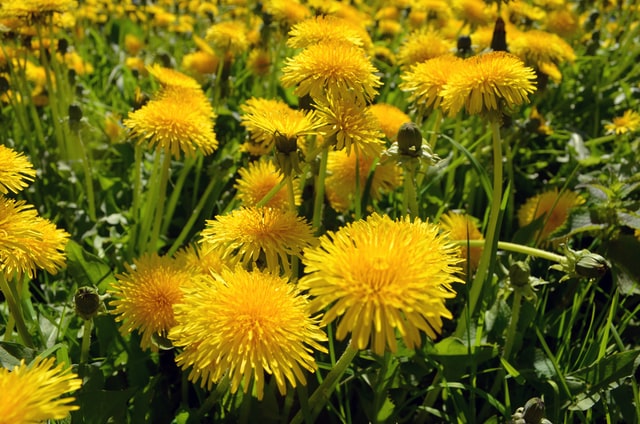Overnight, dandelions grow and ruin a perfectly green lawn and push out the petunias in your flower garden. But instead of trying to kill the yellow weeds that are everywhere, you might want to invite them into your kitchen.
Dietitian Nancy Geib, RD, LDN, says, “Dandelion is a herb, and herbs are good for your health and nutrition in many ways.”
Why should you eat more of them? Let’s make a list.
Dandelion benefits your health
There are a lot of vitamins and minerals in a small dandelion plant. Geib says that they are likely the most nutritious greens you can eat, even more so than kale or spinach.
In particular, dandelion greens are a great source of vitamins and minerals like:
- A, C, and K vitamins.
- Folate.
- Calcium.
- Potassium.
Benefits of dandelions for your health
Not only are dandelions full of nutrients, but they also have chemicals in them that may help prevent health problems. Scientists don’t pay much attention to wild herbs and plants, which is a shame. Geib says that more research needs to be done to find out everything that dandelions can do.
“Still, some research shows that dandelion has a few good points,” she says.
Provide antioxidants
Geib says that the roots, leaves, and flowers of dandelions all have different types of antioxidants. Antioxidants protect your body from free radicals, which are molecules that can hurt your cells and speed up the ageing process.
Lessen pain and swelling
Cancer, heart disease, and a long list of other very serious health problems are all linked to chronic inflammation in the body. Foods that fight inflammation are one way to stay healthy. Add dandelion to your diet to help reduce inflammation. Compounds in these plants have been shown in lab studies to reduce inflammation.
Control your blood pressure
The potassium in dandelions makes them a natural way to make you go to the bathroom. To put it another way, they make you urinate. People often take diuretics to help keep their blood pressure in check.
Watch your blood sugar
Dandelion has been used as a natural way to treat Type 2 diabetes all over the world. Researchers are still looking into this connection, but studies on animals show that the chemicals in dandelions might help people with diabetes lower their blood sugar levels.
Bring down cholesterol
Getting your cholesterol down is one of the best ways to lower your risk of heart disease. Animal studies have shown that extracts from the roots and leaves of the dandelion can naturally lower cholesterol.
How to eat Dandelion.
Geib says that the best thing about dandelion is that every part of the plant can be eaten. She tells you how to cook this free-range herb:
- Greens: Dandelion leaves are on the bitter side, but they have a spicy kick like arugula. Try making a salad with some clean, fresh leaves. Geib says that you can also cook them to make them less bitter. Soak the leaves in cold, salted water for 10 to 15 minutes, then cook them in boiling water until they are soft (no more than five minutes). Sauté the boiled greens with some olive oil, garlic, or onion to finish. Add some Parmesan cheese on top.
- Flowers: The bright yellow flowers of dandelions add colour to a salad. Dandelion flowers can be used fresh or dried to make tea or wine. Geib says you could also try putting them in oil or vinegar. (Oil that has been infused with dandelion can also be used to make a salve for sore muscles.)
- Roots: Roasted dandelion roots are used to make a drink that tastes like coffee and is good to drink. Health food stores sell alternatives to coffee made from dandelion.
Dandelion supplements
Can supplements and extracts give you the benefits of dandelion? Geib says it’s possible, but the science isn’t clear. Since there hasn’t been much research on dandelion supplements, there aren’t any clear guidelines for how much to take.
She adds that dandelion is probably the same as most other foods in that it is best to eat it when it is fresh. But if you don’t like the taste (or if the plants aren’t in season), you could ask your doctor if dandelion supplements might be helpful.
If you take certain medicines, you should talk to your doctor or nurse. Some drugs may not work well with dandelion supplements.
- Lithium.
- They thin the blood.
- There are some antibiotics.
- Diuretics (aka water pills).
- Some medicines for the heart and blood pressure.
Should you add dandelions to your diet?
There are a lot of good things about dandelions, but there are some things you should know before you eat them. You can pick the flowers from your own yard, but Geib warns, “If you’re harvesting wild dandelions, make sure you pick them from an area you know hasn’t been treated with pesticides or other chemicals.”
You don’t have to eat them every day to get the benefits, but you could if you wanted to. Geib says to treat them like any other herb and rotate them into your diet to make it more colourful and interesting.
Geib says, “Dandelions are great because they are healthy and can be used as medicine.” “Don’t be afraid to do something different.”
